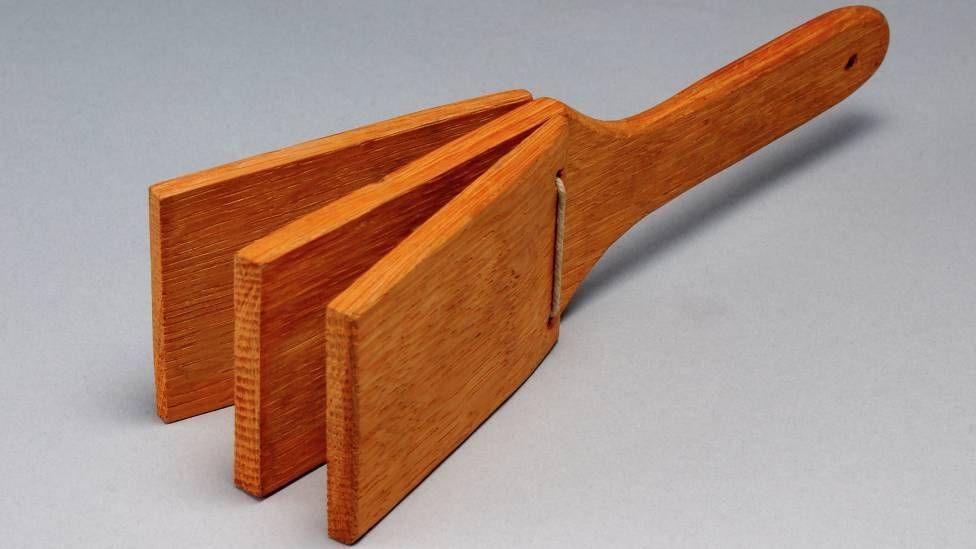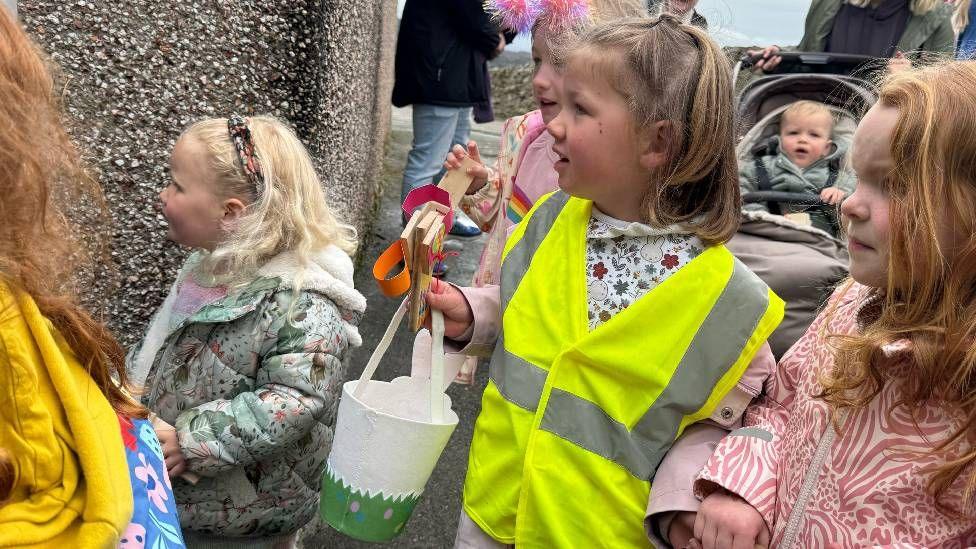Reviving the lost tradition of egg clapping

Egg clapping was popular on Anglesey throughout much of the 19th and 20th Centuries, but went into decline from about the 1960s
- Published
Over the Easter weekend, children around the world took part in egg hunts to celebrate one of the most important festivals in the Christian calendar.
But in one corner of Wales some partook in a slight variation of this popular tradition – egg clapping.
The activity was practiced on Anglesey in the 19th and 20th Centuries before undergoing a demise from about the 1960s as rural traditions began to disappear.
However, a local organisation is leading efforts to revive the practice on the island as part of wider efforts to celebrate and protect local heritage.
Parking plea at beauty spot to avoid Easter chaos
- Published13 April
Easter egg hunt in cemetery pulled after backlash
- Published29 March 2024
The exact origins of clapio wyau, or egg clapping, are unclear, but it appears to have originated some time in the 19th Century mainly in rural communities on Anglesey.
Children would visit neighbours with their wooden claps, recite a rhyme and ask for eggs – chicken eggs in those days – that they would take home to display on their mantelpiece.
The rhyme had some variations, but according to one telling by Museum Wales went:
Clap, clap, os gwelwch chi'n dda ga'i wŷ (Clap, clap, please may I have an egg)
Geneth fychan (neu fachgen bychan) ar y plwy' (Young girl (or young boy) on the parish)
The children would then be asked by the occupier "And who do you belong to?" before they were given an egg to add to their collection.
Allow X content?
This article contains content provided by X. We ask for your permission before anything is loaded, as they may be using cookies and other technologies. You may want to read X’s cookie policy, external and privacy policy, external before accepting. To view this content choose ‘accept and continue’.
Speaking to the BBC in 1965, Nelli Jones, from Cemaes Bay on Anglesey, said she went egg clapping every year between the ages of two and 16.
It was a tradition her great-grandmother, grandmother and mother took part in.
Ms Jones said she did not know how the tradition started but the children in the village "couldn't sleep" the night before because of excitement.
Starting at about 06:00 BST, they would take their basket of straw for their eggs, their clapper and a spare piece of string in case it broke, and go clapping all day, returning in the evening.
"If you had a good day you could clap 150 eggs," Ms Jones said, adding the family was often "on an egg diet for weeks" afterwards.
Some eggs would also be brought into school the next day and sent to a hospital in Bangor.
Ms Jones also showed the presenter her clapper – a wooden implement built by her father – which had written on it the years she had taken part. It showed the last time she had been was in 1939, 26 years earlier.
Ms Jones lamented the demise of the practice, saying her two older children, including her son aged 21, had never been egg clapping.
"I think it's a great shame to see old customs die," she said.

Since 2012, Menter Môn has been holding annual egg clapping events on Anglesey during the Easter holidays.
Many decades later there are now efforts to keep the tradition alive.
Since 2012, Menter Môn, an organisation promoting Welsh customs on Anglesey, has been holding annual egg clapping events during the Easter holidays.
Angharad Evans, from Menter Môn, said the event was an important way for children to connect with Welsh heritage and activities, as well as the language.
The events today see children given their own egg clappers that they colour in, before going around the local area reciting the traditional rhyme in Welsh and asking for eggs – these days in the form of chocolate.
Ms Evans described the event as "fun" and "inter-generational", and said her father, who is in his late 80s, remembered doing it.
"We've found the grandparents really enjoy it – often they remember doing it themselves and there's real nostalgia for them. And for the children it's a bit of adventure, a bit different to the traditional Easter egg hunt," she said.
"It's nice, and gives the children a good look into how things were done in the past," she said.